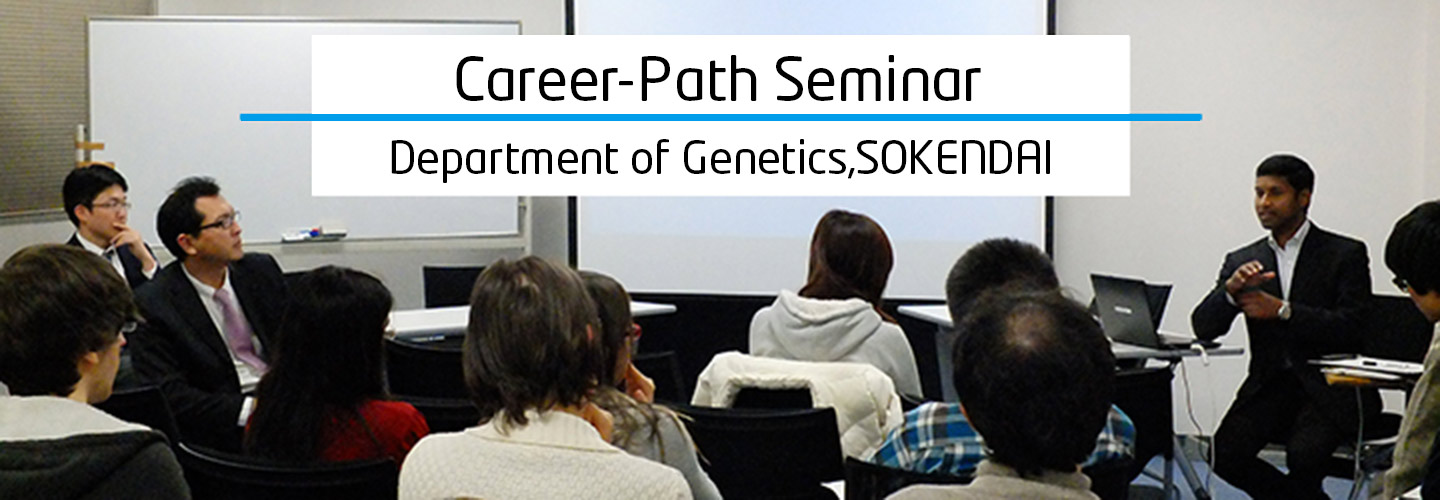Career-Path Seminar

On Tuesday, January 21st in 2014, The Career-Path Seminar was held for the students of Department of Genetics, SOKENDAI at the National Institute of Genetics. In order for the students to think about their career path, alumnae and alumni who are active in various fields were invited and gave lectures about their experiences. In the part 2 of this seminar, Mr. Suganthan gave a lecture with the theme of “Active Fields for Foreign Students in Japan”. He had a strong passion to act as a bridge between Japan and other countries to promote Japanese technologies to overseas, so he decided to become an employee in the technology company in Japan. In this article, we pick up some key points about “Foreign Students’ Employment in Japan” from his speech.
Speaker Profile
 Mr. Suganthan obtained master’s degree at the Department of Biotechnology, Bundelkhand University India in 2002. After working for 2 years as a Bacterial Transcription Research Scholar in India, he came to Japan as MEXT research student in 2004. He joined Professor Nobuo Shimamoto’s laboratory at the National Institute of Genetics and studied for 4 years. In 2008, Mr. Suganthan got a job at HORIBA, Ltd. which is famous worldwide leading manufacturer of analytical and measurement instruments.
Mr. Suganthan obtained master’s degree at the Department of Biotechnology, Bundelkhand University India in 2002. After working for 2 years as a Bacterial Transcription Research Scholar in India, he came to Japan as MEXT research student in 2004. He joined Professor Nobuo Shimamoto’s laboratory at the National Institute of Genetics and studied for 4 years. In 2008, Mr. Suganthan got a job at HORIBA, Ltd. which is famous worldwide leading manufacturer of analytical and measurement instruments.
How to find the job in Japan
 First, he recommended using web sites to find jobs in Japan. Rikunabi (http://www.rikunabi.com/), Mynabi (http://job.mynavi.jp/) and Nikkei (https://job.nikkei.co.jp/) are top 3 famous recruiting web sites in Japan. Dijob (https://www.daijob.com/en/) and CareerCross (http://www.careercross.com/) are bilingual sites. JOBRASS (http://gakusei.jobrass.com/info/synthesis/) and Offer Box (http://offerbox.jp/) are the scouting sites where you can register your resume so that companies would find you as a candidate of their employee.
First, he recommended using web sites to find jobs in Japan. Rikunabi (http://www.rikunabi.com/), Mynabi (http://job.mynavi.jp/) and Nikkei (https://job.nikkei.co.jp/) are top 3 famous recruiting web sites in Japan. Dijob (https://www.daijob.com/en/) and CareerCross (http://www.careercross.com/) are bilingual sites. JOBRASS (http://gakusei.jobrass.com/info/synthesis/) and Offer Box (http://offerbox.jp/) are the scouting sites where you can register your resume so that companies would find you as a candidate of their employee.
He also describes the importance of participating in the job seminars to get information about the employment in Japan. Other resources to get the company information are books like “Japanese Company Handbook” or “会社四季報”.
Second, he encourage to have a help who understands Japanese language well because the amount of information on web sites written in Japanese is much larger than the information written in English.
Third, he provided some useful tips on how to find the company which is doing operations internationally, especially in your country. You may have a chance to keep relationship with the company even when you go back to your country in the future. The home page of Japanese embassy in your home country would be a good information source to find Japanese companies which have their branch office in your country.
Job qualifications
Currently, Mr. Suganthan is working in the International Sales Department of HORIBA. His main task is to contribute business growth and development in India. He is doing sales and marketing planning and execution, distributor management, customer visits and organizing business promotion seminars in India. He is also doing market survey to know the market needs and customers’ voice to reflect them for future product development.
There were some qualifications for this position such as, “Bachelor degree or more in specific field”, “English communication skill, business level Japanese language skill and other foreign languages”, “Knowledge on computer operations”. Mr. Suganthan stressed that the most important point was “Have clear vision on your ways of contribution that improves the company business”. Expressing what you can contribute to company’s business growth with your skill, this is the important attitude when you have an interview for employment. Actually some levels of Japanese language ability is required, but he stated, “Skill first, language is next”.
As for the career possibilities for PhD, of course there are job opportunities available in research and development job in your field, or sales and marketing for those who have additional certification like MBA.
Messages to the students from alumnus
 Mr. Suganthan gave some suggestions to the students about the things you should have done during the school life. Firstly, you should clarify the future career after graduation.
Mr. Suganthan gave some suggestions to the students about the things you should have done during the school life. Firstly, you should clarify the future career after graduation.
At that time, you should discuss with your mentors, friends and seniors. Then you need to focus on diploma and certificate that may help to build your skill for future career. Being involved with events or projects is good chance not only to obtain skills such as planning, organizing and executing but also to make human connections which will be a help after graduating school. If you decide to work in Japan, you need to improve your Japanese language skills and understand Japanese culture more.
From Mr. Suganthan’s lecture, we found that your experience in the Department of Genetics SOKENDAI skills such as research and development and knowledge in your professional discipline would surely help you even if you decide to choose the career target in non-academic field after graduate school.















